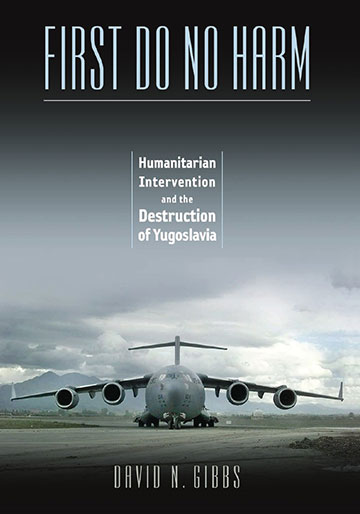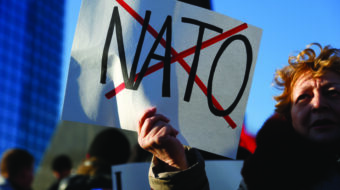
If you want to understand why our government is so worked up about Ukraine, a good place to start is with U.S. actions in Yugoslavia some 25 years ago. To begin, read “First Do No Harm: Humanitarian Intervention and the Destruction of Yugoslavia,” an eye-opening 2009 book by historian David Gibbs.
Well before the Ukraine crisis broke into the headlines, I had decided I needed to educate myself about what happened in Yugoslavia in the 1990s. The breakup of that country was marked by horrific ethnic strife and bloodshed, and two massive U.S./NATO bombing campaigns hailed by Bill Clinton and others as “good” wars on behalf of human rights. Searching for a balanced look at this history, I came across mention of “First Do No Harm.” As the furor over Ukraine erupted, I knew it was time to read Gibbs’ book. I suggest you do the same.
Gibbs, a history professor at the University of Arizona, notes in his introduction that he was spurred to write the book to answer the question: Why has the U.S. continued a Cold War foreign policy even though the Cold War ended. He suggests that the U.S. claim of humanitarian intervention in Yugoslavia, immediately after the collapse of the Soviet Union and other socialist states, “helped establish a new rationale – however specious – for militarism.”
“The Yugoslav case,” he writes, “served to define U.S. intervention as a benevolent and even altruistic activity, and this image has proven useful as a justification for virtually all overseas action.”
Yugoslavia at the end of the Cold War was a multi-ethnic socialist-oriented federation of six republics. Gibbs shows how, in 1990-91, Western Europe, in particular Germany, and then the U.S. encouraged and aided the secession of, first, the two wealthiest Yugoslav republics – Croatia and Slovenia. Then they moved on to Bosnia-Hercegovina, where a lengthy battle over secession culminated in a U.S./NATO bombing campaign that ended in the breakup of what was left of Yugoslavia. All these secessions were in violation of the existing Yugoslav constitution.
Kosovo, an autonomous region within Yugoslavia’s Serb Republic, had its own secession movement and insurrection, actively backed by the U.S. and NATO. It wound up with a several-month U.S./NATO bombing war in 1999.
Fast forward to 2014, and the U.S. and its western European allies’ outraged objection to the secession of Crimea from Ukraine.
I asked Gibbs about this policy switch, which some have called hypocritical. His response:
“Prior to 1991, there was a strongly international norm against secession and breaking up countries. It was generally accepted by almost all countries including the USA and USSR, despite the Cold War. That norm effectively ended however in 1991, with secessions of Slovenia and Croatia from Yugoslavia and then the Baltic States from the USSR … Basically the international norm against secession was ended in 1991, but the NATO states are (somewhat inconsistently) trying to resurrect it with regard to Crimea. The resurrection of the anti-secession impulse with regard to Ukraine seems more based on realpolitik than international law or principle.”
In “First Do No Harm,” Gibbs shows how “realpolitik” was a decisive factor in the thinking and actions of the U.S. and Western Europe in regard to the breakup of Yugoslavia. (Russia, in the throes of the breakup of the USSR, was not a significant player.) There were terrible humanitarian crises – massacres, ethnic cleansing. But he carefully documents how U.S./NATO actions actually worsened the bloodshed and delayed diplomatic solutions, because U.S. and western policymakers prioritized their own geopolitical concerns.
What were these concerns?
One: Following the collapse of the Soviet Union, the U.S. and Western European countries were competing for power in Eastern Europe. Dominant U.S. foreign policy circles were anxious to establish U.S. hegemony in the region, as well as globally – an outlook that continues to this day.
Two: In the post-Cold-War era, the U.S. and its Western European allies were anxious to find a new reason to justify the existence of their Cold War military alliance, NATO. Moreover, they sought to legitimize NATO action outside its original North Atlantic region. We saw how this “humanitarian intervention” precedent was invoked not long ago in Libya.
Gibbs provides an interesting discussion of the 1992 U.S. intervention in Somalia under President Clinton. Rather than furthering the claimed humanitarian function, he writes, the U.S. action served to remind the public “that the U.S. military remained relevant when its relevance was open to question.” Further, “it reaffirmed the importance of U.S. dominance and helped cast this dominance in a benevolent light.”
All this sheds a lot of light on today’s Ukraine crisis. Notice, for example, that NATO has taken the opportunity to ramp up its involvement in Eastern Europe, along Russia’s border.
Yet despite the confrontational posturing, Gibbs sees a significant difference from the Yugoslav situation. “A key development with regard to Ukraine is the unwillingness of the U.S. and NATO to intervene with military force,” he told me. “It appears that military force is not even being considered as an option.”
In his view, that is due to widespread public opposition to military intervention. “This stands in stark contrast with the situation of the 1990s, when the U.S. clearly did use military force in Bosnia and Kosovo,” Gibbs said. “Now, two decades later, the public is simply tired of militarism.”
Read the book. I have only skimmed the surface of the wealth of information and insights it contains.
Book information:
“First Do No Harm: Humanitarian Intervention and the Destruction of Yugoslavia”
By David N. Gibbs
2009, Vanderbilt University Press, paperback, 334 pages, $27.95; Kindle $16.79












Comments